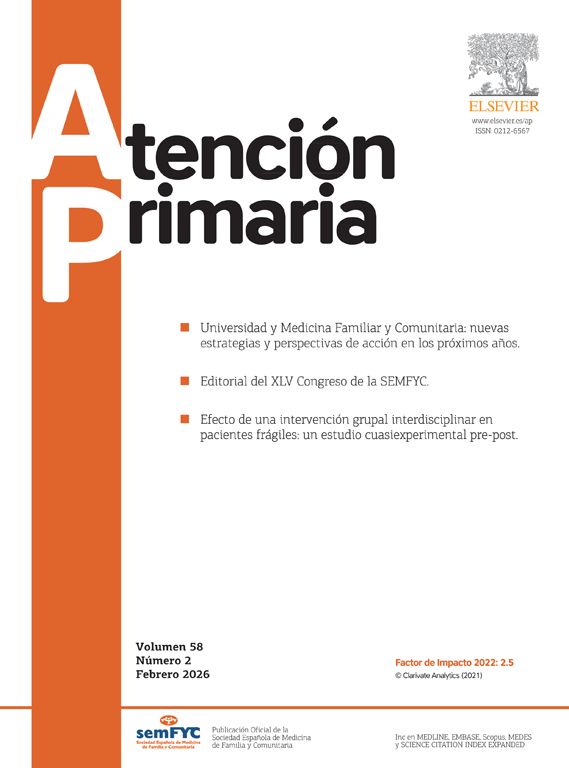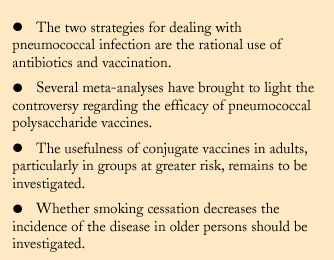The two strategies for dealing with pneumococcal infections are the rational use of antibiotics and vaccination. Effective prevention of Streptococcus pneumoniae infection has become a priority in the current era, when the emergence of antibiotic-resistant strains can compromise efforts to reduce mortality from invasive pneumococcal infection.
Despite the seriousness of pneumococcal disease, we do not yet have a vaccine that has been shown to be effective in all target groups. Polysaccharide vaccines are effective in preventing invasive disease in immunocompetent persons. However, studies in different groups of the immunodepressed population have shown their efficacy in these groups to be questionable. The is still little evidence of their usefulness in persons with asthma, patients with HIV infection, andas discussed in this editorialin persons older than 65 years. Moreover, recommendations for vaccination have thus far not included other subgroups at high risk for the disease, such as smokers and African Americans.1
As regards the immunogenicity of the vaccine, the immune response induced is not the same in all patients or for all serotypes. Moreover, immunogenicity does not guarantee that opsonizing antibodies will be produced. One study showed a pneumococcal polysaccharide vaccine to be ineffective in older persons because of the lower production of opsonizing antibodies regardless of the titer of antibodies achieved.2
Several meta-analyses have brought to light the controversy regarding the efficacy of pneumococcal polysaccharide vaccines. The analysis by Moore et al. confused circumstances with populations, and as noted in an earlier commentary, the effectiveness of the vaccine was compared in the general population, immunocompromised patients and older persons.3 The authors of the meta-analysis published in this issue of Atención Primaria are to be commended for responding to the challenge of undertaking a study of high quality in the setting of their primary care activities. However, the study is also remarkable for its rigor in the exhaustive search methods used and in its effort to examine a particular subpopulation characterized by immunodepression.
The authors found no proof that pneumococcal polysaccharide vaccination was effective in older persons. As the authors note in their article, the meta-analysis by Hutchinson et al. yielded findings that contradicted those of Puig et al. because the former combined results for different age groups. When this fact was taken into account, the statistical significance of the estimates disappeared. The review by Cornu et al. likewise failed to find any preventive effect, a result the authors attributed to weak statistical power.4
However, questions have been raised with regard to the indication for vaccination. Is it ineffective but nonetheless cost-effective? Does a combined strategy of vaccination during the flu vaccination campaign improve performance by extending coverage? Some clinical studies suggested an additive effect of double vaccination in preventing community-acquired pneumonia, particularly in older persons at greater risk for this disease and for hospitalization.5 Is pneumococcal vaccination advisable for older institutionalized patients to prevent outbreaks of the disease? Are there any subgroups among older persons for which the indication for vaccination has been clearly established, such as persons with chronic obstructive lung disease? Some indications seem to reserve a role for this controversial vaccination.
The recent appearance of conjugate pneumococcal vaccines, which are currently useful in pediatrics, appears to disrupt the transmission of antibiotic-resistant pneumococci, and thereby reduce the rate of resistance in the immunized population and persons who come in contact with immunized individuals, as a result of the «herd effect». One question worth examining is whether a joint strategy of child vaccination with the conjugate vaccine and the simultaneous administration of flu and pneumococcal polysaccharide vaccination in older persons would lead to a significant decrease in the disease, particularly in cases caused by resistant germs. The effectiveness of conjugate vaccines for adults, especially for groups at greatest risk, also remains to be investigated.
A fundamental consideration is immunological memory. Experience to date is limited to Haemophilus influenza type B vaccination, whose epidemiological impact was evident when a conjugate vaccine was used but not with a vaccine prepared from a panel of polysaccharides. Even with the limited information available, the theoretical superiority of conjugate pneumococcal vaccines does not guarantee clinical efficacy.6 The availability of these vaccines makes additional in-depth epidemiologic studies even more necessary to determine the mortality and morbidity associated with the disease, the serogroups that cause invasive and noninvasive disease, and the serogroups linked to higher rates of resistance. In addition, information is still needed on the existence of carriers and the possible shift of the ecological niche toward other, previously less pathogenic serogroups. The geographic variability of invasive pneumococcal disease supports the need for such studies, and should favor the development of vaccines with shared antigens such as Pneumococcus surface protein A (PspA) or Pneumococcus surface adhesin (Psa A).3
As important factor in health care management is cost-effectiveness. In Spain, studies of the type suggested above should be done to determine whether or not vaccination is indicated for older persons, and scientific evidence should be used to try to avoid inequities in the health care system.
In conclusion, these are the main issues awaiting resolution:
The population of older persons who respond poorly to 23-valent pneumococcal capsular polysaccharide vaccination can be identified as a target population for improved vaccines (conjugate and DNA, currently in the experimental phase).
Efforts are needed to determine whether treatment of a correctable nutritional deficit would improve the immune response to the polysaccharide vaccine in this group.
Whether the adult population responds more uniformly to new (ie, conjugate and DNA) pneumococcal vaccines should be determined.
Whether smoking cessation decreases the incidence of invasive pneumococcal disease in older persons should be investigated.7









